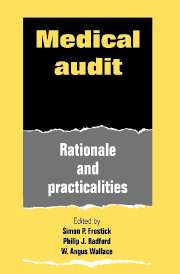Book contents
- Frontmatter
- Contents
- List of contributors
- Foreword
- Foreword
- 1 Introduction
- 2 Audit: historical and future perspectives
- 3 Audit philosophy
- 4 Medical audit: a view from the centre
- 5 Audit: a view from the Royal College of Surgeons of England
- 6 The regional viewpoint
- 7 Medical audit: the needs of the District Health Authorities
- 8 Resource management and budget holding
- 9 Unit and district information systems
- 10 Read codes and medical audit
- 11 Data capture direct from doctors
- 12 Computer systems: practice, limitations and pitfalls
- 13 Paediatric audit
- 14 Audit in obstetrics and gynaecology
- 15 Audit in general surgery
- 16 Orthopaedic audit: guidelines and hints
- 17 Installing audit in general practice and general dental practice
- 18 Clinical audit in psychiatry. Models for audit in mental health
- 19 Audit in anaesthesia
- 20 Audit in intensive care
- 21 Medical audit: lessons from the USA
- 22 Quality control in health care: the Dutch experience
- 23 Medical audit: experience from Sweden
- 24 Performance indicators
- 25 Measuring outcome and quality control
- 26 Audit: will it work?
- 27 What has been achieved so far?
- 28 A practical guide to audit
- Index
3 - Audit philosophy
Published online by Cambridge University Press: 30 September 2009
- Frontmatter
- Contents
- List of contributors
- Foreword
- Foreword
- 1 Introduction
- 2 Audit: historical and future perspectives
- 3 Audit philosophy
- 4 Medical audit: a view from the centre
- 5 Audit: a view from the Royal College of Surgeons of England
- 6 The regional viewpoint
- 7 Medical audit: the needs of the District Health Authorities
- 8 Resource management and budget holding
- 9 Unit and district information systems
- 10 Read codes and medical audit
- 11 Data capture direct from doctors
- 12 Computer systems: practice, limitations and pitfalls
- 13 Paediatric audit
- 14 Audit in obstetrics and gynaecology
- 15 Audit in general surgery
- 16 Orthopaedic audit: guidelines and hints
- 17 Installing audit in general practice and general dental practice
- 18 Clinical audit in psychiatry. Models for audit in mental health
- 19 Audit in anaesthesia
- 20 Audit in intensive care
- 21 Medical audit: lessons from the USA
- 22 Quality control in health care: the Dutch experience
- 23 Medical audit: experience from Sweden
- 24 Performance indicators
- 25 Measuring outcome and quality control
- 26 Audit: will it work?
- 27 What has been achieved so far?
- 28 A practical guide to audit
- Index
Summary
Introduction
There is now general agreement among the medical profession, health care managers, the public and the Government that the measurement by doctors of medical performance is an essential element of service. A growing requirement by the Royal Colleges for more formal audit in the middle 1980s was accelerated by publication of the Confidential Enquiry into Perioperative Deaths (CEPOD) in 1987 and the Government White Paper in 1989. The CEPOD report made very clear and public a number of areas in which clinical work (and patients) would benefit from more rigorous scrutiny. The White Paper required formal audit to be established in hospitals in the NHS by April 1991. There remain concerns that the general principles of audit are agreed but the details of implementation may differ in the eyes of managers and clinicians. It is therefore worth emphasising the stated view of the English Royal Colleges of Physicians and of Surgeons that the purpose of audit is primarily the quality of medical care, second, standards of medical training and education and third, the effective use of resources. Although the use of resources is primarily a management concern, it is notable that it was expressly included as a subsidiary goal by these two colleges.
- Type
- Chapter
- Information
- Medical Audit , pp. 18 - 25Publisher: Cambridge University PressPrint publication year: 1993

